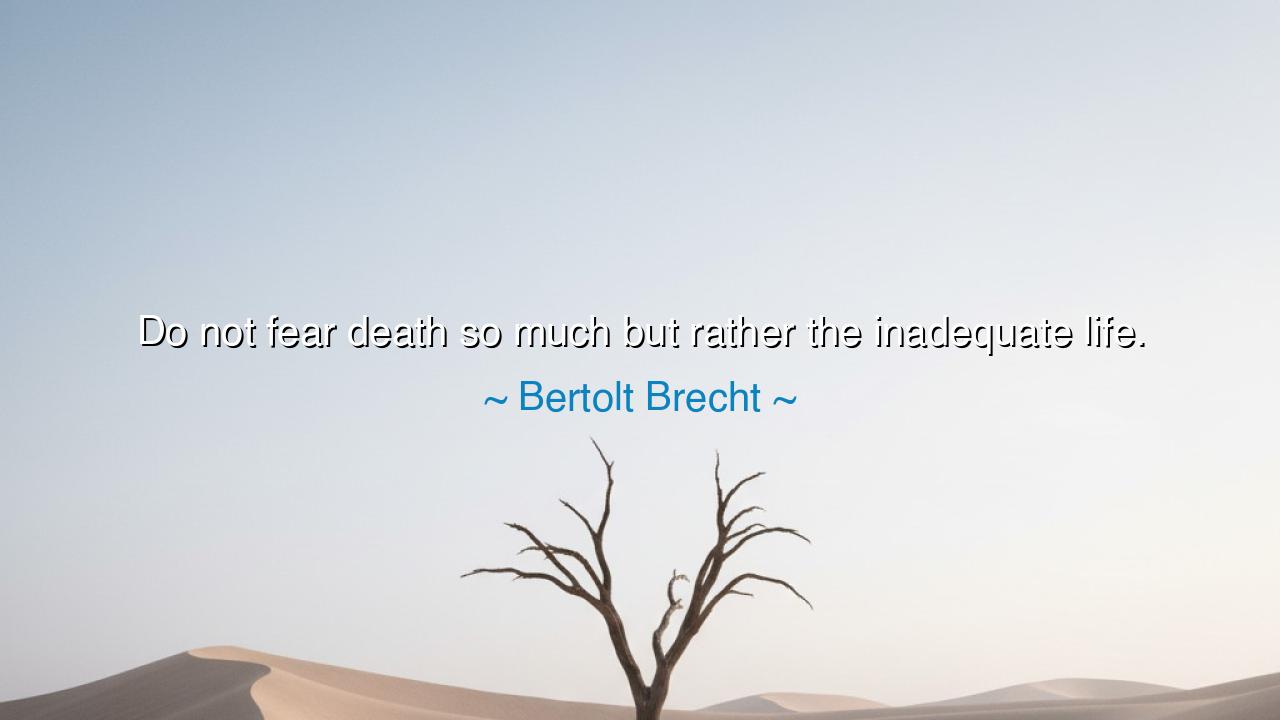
Do not fear death so much but rather the inadequate life.






The words of Bertolt Brecht, “Do not fear death so much but rather the inadequate life,” strike like thunder upon the timid heart and awaken the soul from slumber. They are not merely a warning, but a command — a call to live boldly, to live fully, and to live truly. For Brecht, the tragedy of existence is not that we must die, but that so many die without ever having lived. Death, he reminds us, is the natural end of all things; it is inevitable, impartial, and ancient. But an inadequate life — one spent in fear, conformity, or passivity — is a betrayal of the divine gift of consciousness itself.
To the ancients, this teaching would have been received with deep reverence. The Stoics, too, spoke often of memento mori — “remember you will die” — not to instill dread, but to inspire courage and purpose. For what, they asked, can death take from the man who has already lived well? Brecht’s words breathe that same wisdom: death has no sting for the one who has filled his days with meaning. It is only those who live half-heartedly, who bury their dreams beneath fear or comfort, who tremble at the approach of the inevitable. Death is not our enemy — wasted time is.
Brecht himself lived through an era of turmoil and oppression, when tyranny sought to silence truth and reduce the human spirit to obedience. A playwright and poet, he spoke out against injustice and hypocrisy, often at great personal risk. His quote emerges from that furnace of struggle. He saw too many men survive by submission, and too few live by conviction. For Brecht, the inadequate life was one that traded truth for safety, creativity for approval, and freedom for comfort. To fear death more than mediocrity, he believed, was to miss the very essence of life’s purpose — to live with integrity and passion, even in defiance of consequence.
Consider the example of Socrates, who stood before the court of Athens accused of corrupting the youth and defying the gods. Offered a chance to save himself by renouncing his teachings, he refused. “The unexamined life is not worth living,” he said — words that mirror Brecht’s wisdom across the centuries. Socrates did not fear death; he feared only an inadequate life, one stripped of truth and courage. And so he drank the poison calmly, choosing principle over survival. His death became not an end, but a triumph — proof that a well-lived life can make even death powerless.
In truth, Brecht’s quote is a mirror held before every soul. It asks: how do you live? Do you move through the world in fear, measuring your steps by the approval of others? Do you silence your convictions to keep the peace? Do you hide your dreams behind excuses of time and circumstance? If so, then you are already dying, long before death arrives. To live inadequately is to breathe without wonder, to exist without purpose, to walk through the years untouched by passion or authenticity. It is not death that ends life; it is cowardice that prevents it from beginning.
And yet, there is hope in Brecht’s fire. For the inadequate life is not a prison without a key. Every moment offers a chance to begin again — to speak the truth, to follow one’s calling, to love without restraint. To live adequately is not to live grandly, but to live consciously: to be awake to beauty, to act with integrity, to choose meaning over convenience. Even the smallest act done with courage redeems the soul from inadequacy. To create, to serve, to forgive — these are the deeds that make life full, even in the shadow of death.
So, my listener, take this teaching as a sacred challenge: do not fear death, for it is but a doorway, the final note in life’s song. Fear instead the empty years — the days spent in quiet resignation, the nights wasted on regret. Do not seek merely to endure; seek to burn brightly, to live so fully that when death comes, it finds you alive to the very last breath. Let your words be honest, your work sincere, your love unguarded. Then death will not be your conqueror but your companion, arriving not as a thief, but as a friend who comes for one who has truly lived.
For as Bertolt Brecht teaches, the measure of life is not its length, but its depth. Death is certain, but meaning is a choice — and to choose it daily is to triumph over mortality itself. So live fiercely, live wisely, and above all, live without fear — for in doing so, you will have already defeated death before it reaches your door.






AAdministratorAdministrator
Welcome, honored guests. Please leave a comment, we will respond soon